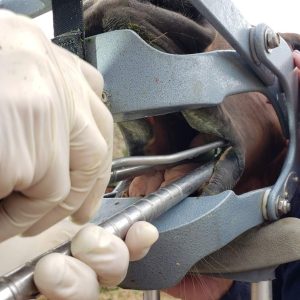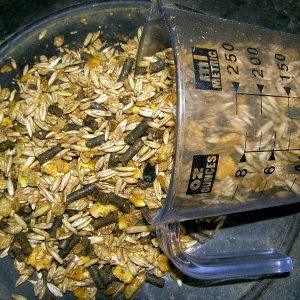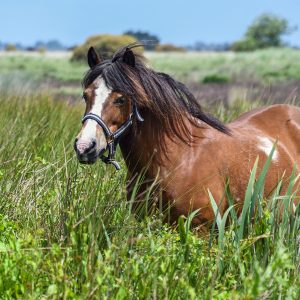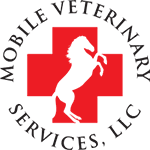When feeding your senior horse, there are several important factors to keep in mind that can change their dietary requirements.
Dental Condition
Number one is the status of your horse’s teeth. You may have heard the term “expired” teeth when your veterinarian is examining your horse’s mouth. This term refers to the fact that horses’ teeth become worn down over time with all the grinding of their feed and can even wear all the way down to the gum line. These expired teeth can no longer effectively grind forage into the small pieces necessary for a horse to gain nutritional value.

The lack of effective grinding can also predispose horses to choke and impaction colic from swallowing long pieces of hay. As a result, we often recommend starting our senior horses on more processed diets, such as hay pellets, hay cubes, or complete senior feeds. These forage alternatives are already processed into smaller particles, making it much easier for the horses to digest. It is recommended to soak these types of feed in water to reduce the risk of choke. When soaking feed, it is recommended to use a ratio of 2:1 (water to feed), especially if the feed contains beet pulp, and allow it to sit for 30 minutes or even longer if the water is cold. The mash should ideally end up with an oatmeal-like consistency.
GI Changes
In addition to the teeth, there are some age-related changes to the rest of the GI tract that can affect feeding protocols. There is an overall reduction in the absorption of nutrients in a senior horse due to changes in the microbiome and scarring of the intestines. Supplementing with a probiotic, such as Platinum Performance GI or Arenus Assure Guard Gold, can help regulate the microbiome and improve nutrient absorption.
Senior horses are also less efficient at digesting crude protein, meaning that their dietary protein requirement is higher – it is often recommended to feed 12-14% crude protein to older horses, as opposed to the 10-12% recommended for younger horses. Geriatric horses often tend to require more highly digestible fiber sources, such as beet pulp, to keep them healthy. It is important to keep the crude fiber content of their diet over 10% to meet their physiologic needs.

Regardless of age, horses require approximately 1.5 – 2% of their body weight in dry matter per day – whether that’s mainly hay or almost completely comprised of processed feeds, we need to make sure they are receiving the appropriate amount for their weight. Weighing your scoops of grain is very helpful in determining if your horse is getting enough food. For example, a 1000 pound horse being maintained entirely on Purina Equine Senior requires anywhere from 15 to 17 pounds of feed per day depending on their activity level per the label recommendations.
Metabolic Status
A third piece of the puzzle is the horse’s overall metabolic status. Older horses are much more likely to have PPID, or Cushing’s disease, which can make it difficult for them to maintain good body condition, even in the face of good nutrition. These horses need to go on the appropriate medication, Prascend, to allow them to thrive and keep weight on.
On the flip side, horses with EMS (Equine Metabolic Syndrome or Insulin Resistance) often struggle to get weight off. It is important for these horses to be kept on a diet low in non-structural carbohydrates to prevent large fluctuations in glucose levels and elevated insulin levels that can predispose them to laminitis.

Determining if your horse has a metabolic disorder involves running blood work that checks the levels of various enzymes and hormones within the system. ACTH (adrenocorticotropic hormone) is the hormone we look at in Cushing’s disease. In some cases, a horse may have a normal baseline ACTH level but still have Cushing’s disease. If there are clinical signs consistent with Cushing’s disease (muscle atrophy, weight loss, delayed shedding, etc.) your veterinarian may recommend a second test called a TRH stim test to more definitively determine if your horse has Cushing’s disease. Equine Metabolic Syndrome is characterized by insulin resistance, leading to elevated insulin levels, and often elevated glucose levels as well, which are reflected in the bloodwork.
For more information on these metabolic syndromes as well as other conditions that can affect senior horses, please visit our other blog articles:
- Equine Metabolic Syndrome
- Equine Metabolic Syndrome and Equine Cushing’s Disease
- Equine Cushing’s Disease
- Hyperinsulinemic Associated Laminitis
- What is EOTRH?
- Does my Senior Horse have EORTH?
- Choke in Horses
- Caring for your Senior Horse
Each horse ages differently, so it is important to have regular check-ups with your veterinarian to make sure you are meeting all their nutritional needs. Contact us at any time to schedule a check-up and nutrition consult!




